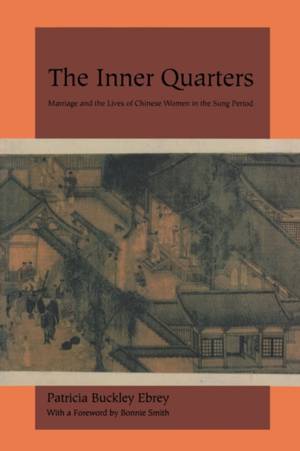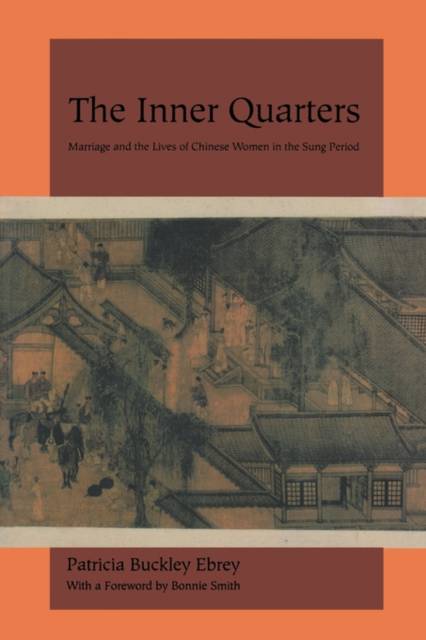
Door een staking bij bpost kan je online bestelling op dit moment iets langer onderweg zijn dan voorzien. Dringend iets nodig? Onze winkels ontvangen jou met open armen!
- Afhalen na 1 uur in een winkel met voorraad
- Gratis thuislevering in België vanaf € 30
- Ruim aanbod met 7 miljoen producten
Door een staking bij bpost kan je online bestelling op dit moment iets langer onderweg zijn dan voorzien. Dringend iets nodig? Onze winkels ontvangen jou met open armen!
- Afhalen na 1 uur in een winkel met voorraad
- Gratis thuislevering in België vanaf € 30
- Ruim aanbod met 7 miljoen producten
Zoeken
The Inner Quarters
Marriage and the Lives of Chinese Women in the Sung Period
Patricia Buckley Ebrey
Paperback | Engels
€ 54,45
+ 108 punten
Omschrijving
The Sung Dynasty (960-1279) was a paradoxical era for Chinese women. This was a time when footbinding spread, and Confucian scholars began to insist that it was better for a widow to starve than to remarry. Yet there were also improvements in women's status in marriage and property rights. In this thoroughly original work, one of the most respected scholars of premodern China brings to life what it was like to be a woman in Sung times, from having a marriage arranged, serving parents-in-law, rearing children, and coping with concubines, to deciding what to do if widowed.
Focusing on marriage, Patricia Buckley Ebrey views family life from the perspective of women. She argues that the ideas, attitudes, and practices that constituted marriage shaped women's lives, providing the context in which they could interpret the opportunities open to them, negotiate their relationships with others, and accommodate or resist those around them.
Ebrey questions whether women's situations actually deteriorated in the Sung, linking their experiences to widespread social, political, economic, and cultural changes of this period. She draws from advice books, biographies, government documents, and medical treatises to show that although the family continued to be patrilineal and patriarchal, women found ways to exert their power and authority. No other book explores the history of women in pre-twentieth-century China with such energy and depth.
Focusing on marriage, Patricia Buckley Ebrey views family life from the perspective of women. She argues that the ideas, attitudes, and practices that constituted marriage shaped women's lives, providing the context in which they could interpret the opportunities open to them, negotiate their relationships with others, and accommodate or resist those around them.
Ebrey questions whether women's situations actually deteriorated in the Sung, linking their experiences to widespread social, political, economic, and cultural changes of this period. She draws from advice books, biographies, government documents, and medical treatises to show that although the family continued to be patrilineal and patriarchal, women found ways to exert their power and authority. No other book explores the history of women in pre-twentieth-century China with such energy and depth.
Specificaties
Betrokkenen
- Auteur(s):
- Uitgeverij:
Inhoud
- Aantal bladzijden:
- 312
- Taal:
- Engels
Eigenschappen
- Productcode (EAN):
- 9780520081581
- Verschijningsdatum:
- 1/12/1993
- Uitvoering:
- Paperback
- Formaat:
- Trade paperback (VS)
- Afmetingen:
- 151 mm x 230 mm
- Gewicht:
- 471 g

Alleen bij Standaard Boekhandel
+ 108 punten op je klantenkaart van Standaard Boekhandel
Beoordelingen
We publiceren alleen reviews die voldoen aan de voorwaarden voor reviews. Bekijk onze voorwaarden voor reviews.











